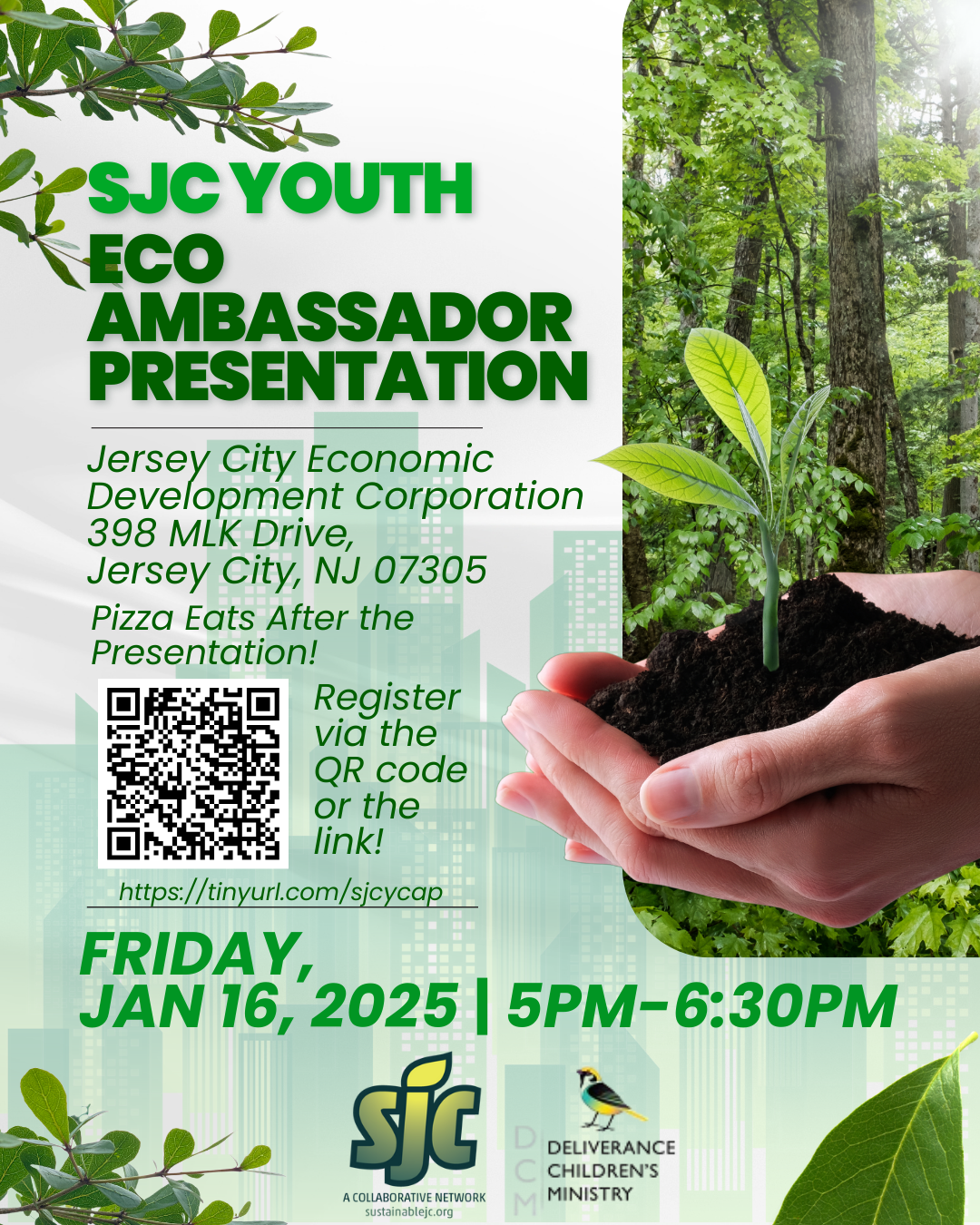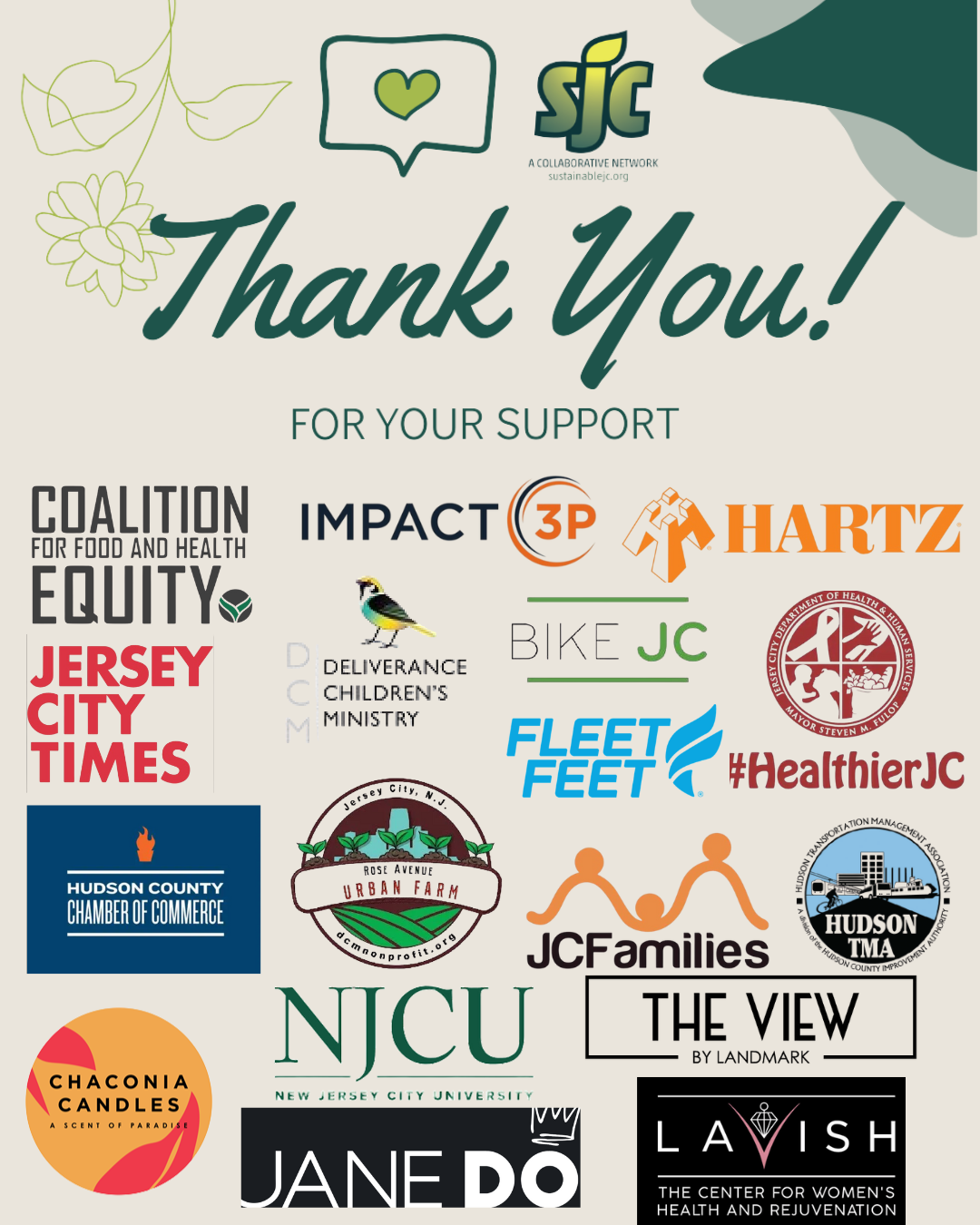By signing SJC’s Charter you will become an Honorary Charter Member of our organization, for which we thank you - membership is FREE 👍
And, by signing the SJC Charter you are adding your name to a growing list of community stakeholders who are interested in making Jersey City a more sustainable and resilient place to live and work. City Hall wants to know what you are thinking and your signature to this document will help us communicate that.
Also, your signature will allow you to receive our periodic blog posts, our monthly SJC Download with news and event updates, which you can opt out of at anytime.
Back in August 2020, in a nod to our mission and the dedication of our members, SJC was officially recognized as a 501(c)(3) educational organization by the U.S. federal government. This designation provides SJC with powerful tools for meeting its sustainability goals and fulfilling its charter, including access to grant funding and tax-deductible donations. More than ever, SJC and its members are equipped to make Jersey City a greener, a more sustainable, and resilient place to live and work~
1. Sustainable Jersey City: Operational Charter
1.1. We represent a collaborative, grassroots network comprised of committed individuals and organizations who are: public and private sector leaders, community activists, and multidisciplinary professionals. Together, we are committed to sustainable community development grounded in collaborative strategies aimed at collective choice, through citizen-based participatory planning and community design forums.
1.2. We are dedicated to conceiving, planning, and implementing regenerative and visionary demonstration projects and programs in Jersey City and supporting others in their efforts to do the same.
1.3. This document is a living, breathing document. That is to say it is an evolving representation of the Sustainable Jersey City organization, as well as a relevant source of action-oriented guidance for green civics minded community stakeholders.
2. Definitions
We take Sustainability to be our organizing Mission, Resiliency to be our operational Goal, and Adaptive Management to be our mode of response. Here, Sustainability is an overarching planning and action framework within which Resiliency is activated, giving us a capacity to respond effectively in good times and bad, with Adaptive Management enabling that capacity. These three concepts, together, work to effect the positive outcomes we seek, both in the present and into the future.
2.1. We take Sustainability to be a holistic planning approach to ecological action, one that takes a balanced and ethical accounting of three nested spheres: economic prosperity (profit and governance), people (society), and planet (the natural world), with a mindfulness toward both the current generation and, equally, toward future generations—that is to say, promoting a high quality of life for all by meeting the needs of the present without curtailing the ability of future generations to also enjoy a high quality of life and have their needs met. The other very important understanding we hold of Sustainability, as a concept and as an enduring approach, is that there are capacity limits to non-renewable natural resources and systems that, once depleted, cannot be reconstituted.
2.2. We take Resiliency to be both a way of viewing the behavior of interconnected systems as a whole and a property of individual sub-systems concerned. We understand Resiliency to be the capacity of any socio-ecological system to absorb or withstand disruptions and shock in such a way that the system essentially maintains its structural and functional integrity. It is not, we feel, just an approach to disaster planning or risk management, as is conventionally thought. Rather, Resilience is about building elasticity into all design and planning systems, throughout their lifecycles.
2.3 We take Adaptive Management to be a technique that allows us to work toward Resiliency before we have complete and “perfect” information about the system we are seeking to transform.
2.4. We also understand that our local actions are nested within regional and global citizenship, and hold our civic actions to be in service of that broader context, implying our understanding and responsibility for the consequences of our actions, both locally and globally.
3. Values
Based on the definitions of Sustainability, Resilience, and Adaptive Management outlined above, we hold the following values:
3.1. Respect for Earth and Life, in all its diversity.
3.1.1. Recognize that all beings are interdependent and every form of life has value regardless of its worth to human beings.
3.1.2. Affirm faith in the inherent dignity of all human beings and in the intellectual, artistic, ethical, and spiritual potential of humanity.
3.2. Care for the Community of Life, with understanding, compassion, and love for the whole.
3.2.1. Accept that with the right to own, manage, and use natural resources comes the responsibility to prevent harm and to protect rights, both personal and toward the highest and best use on behalf of the Commons
3.2.2. Affirm that with increased freedom, knowledge, and power comes increased responsibility to promote the common good.
3.3. Build Democratic Societies that are just, participatory, sustainable, and peaceful.
3.3.1. Ensure that all communities guarantee human rights and provide everyone an opportunity to realize his or her full potential.
3.3.2. Promote social and economic justice, enabling all to achieve a secure and meaningful livelihood that is ecologically responsible.
3.3.3. Promote environmental justice, advocating the understanding and prevention of disparate policies that create either singular or cumulative environmental impacts which adversely affect the health and well-being of various stakeholder groups within our communities.
3.4. Secure Earth's Beauty and Bounty, for present and future generations.
3.4.1. Recognize that the freedom of action of each generation is qualified by the needs of future generations.
3.4.2. Transmit to future generations’ values, traditions, and institutions that support the long-term flourishing of Earth's human and ecological communities.
4. Principles for Action
We hold the following principles as foundations for our actions:
4.1. We advocate community collaboration.
4.2. We advocate participatory, non-violent communication and action.
4.3. We advocate the Precautionary Principle, which holds that all decisions should be weighed against their potential to do harm.
4.4. We advocate the protection of the Commons, in the sense that we value collective good, in and of itself.
4.5. We advocate the creation of Learning Communities through community education and wherever we implement projects and initiatives, enhancing peer learning between networks.
4.6. We advocate thinking in terms of ecosystems and networks, promoting the understanding of the dynamic interconnectedness and impact of all the various parts of our society, environment and governance structures to the whole; this allows for a new, more aware approach to problem solving and a more integrated approach to designing sustainable solutions.
4.7. We advocate the use of Permaculture Design Principles which embrace all of the above Principles for Action and which provides a framework to design functional solutions that yield positive, self-generating outcomes which do not deplete or damage our communities over time.
5. Guiding Ideas for Action
5.1. Sustainable Development
5.1.1. We have a commitment to the ideas of Green Infrastructure and Low Impact Development, always using nature to do our work where possible, as opposed to building hard, grey infrastructure to dominate natural processes and functions.
5.2. Resilience
5.2.1 We have a commitment to think consciously about thresholds and buffers, and to build cushions that allow flex and flow in the processes and functions that undergird our actions through an Adaptive Management approach.
5.3. Sustainable Growth
5.3.1. We have a commitment to the idea of Smart Growth strategies, such as mixed land-use, higher densities, and walkable communities, wherever possible.
5.4. Alternative Transportation
5.4.1. We have a commitment to the ideas of Green Complete Streets and alternative transportation strategies, that is to say, to walking, biking, public transit and low carbon emission choices as our preferred transportation options, wherever feasible.
5.5. Healthy Food Access / Local & Regional
5.5.1. We have a commitment to the idea of widespread access to healthy and affordable food, and the creation of local and regional food infrastructure commerce (food hubs, CSAs, farmers markets, urban agriculture, and so on) that supports both farmers and consumers of food.
5.6. Local Economic Practices
5.6.1. We have a commitment to the ideas associated with the ‘local living economies’ approach to economic vitality including support for more socially responsible business enterprises and green jobs development in order to enhance common-wealth.
5.6.2. We have a commitment to support educating community stakeholders about unsustainable consumption behaviors and the true cost of the flow of certain raw materials, manufactured goods and services that are damaging the planet.
5.7. Technology and Innovation
5.7.1. We have a commitment to the discovery and incorporation of innovative technology tools and techniques to build participatory and collaborative action, such as Concept Mapping, Green Maps, QGIS (open source software) and Social Media platforms, and seek to build community capacity in the use of such tools.
5.8. Community Waste Streams
5.8.1. We have a commitment to Reduction of Waste Streams, Materials Re-use and Recycling as a tri-focus set of priorities; this includes both organic and solid waste (non-organic) streams generated by all residential, commercial and municipal community stakeholders.
5.8.2. We have a commitment to advocate on behalf of city-wide Composting (food / yard organics) and E-Waste (electronics) recycling programs and the launch of an education campaign to empower community stakeholders to reassess economic alternatives that are available to turn waste streams into resource streams for Jersey City.
5.9. Green Energy Use
5.9.1. We have a commitment to clean, efficient and renewable energy for transportation, industry, government and home.
5.9.2. We have a commitment to advocate for the assessment of innovative energy procurement models available in the state of New Jersey that will save money through pooled purchasing programs and allow for clean alternative energy choices without creating economic hardship for community stakeholders, and specifically including this opportunity for low and moderate income households.
5.10. Diversity
5.10.1. We have a commitment to embrace and empower diverse groups of people of all faiths and ethnicities and to work across sectors in an inclusive manner -entrepreneurs, industry artists, activists, professors and policymakers are invited to work with us as stakeholders in creating positive change in our communities.
5.11. Funding
5.11.1. We have a commitment to the idea of seeking out innovative funding options and solutions to support the project initiatives and community-building activities we are inspired to pursue.
5.11. Working Together Effectively
5.11.1. We have a commitment to improve the effectiveness of our civic minded actions when working with other community organizations, individuals, municipal officials and the media, embracing a variety of new skills and knowledge that help contribute to Jersey City becoming a more sustainable place to live and work.
6. Amendments to the Charter
6.1. This Charter may be amended by the Sustainable Jersey City (SJC) Membership.Amendments may be proposed in writing by a Voting Member of the SJC, and must be approved by a two-thirds vote during a regular Meeting of the Voting Membership.
I agree...
After you sign-up as an Honorary Charter Member below and you wish to volunteer with our organization, please fill out our Welcome Survey to kick-off that process.




